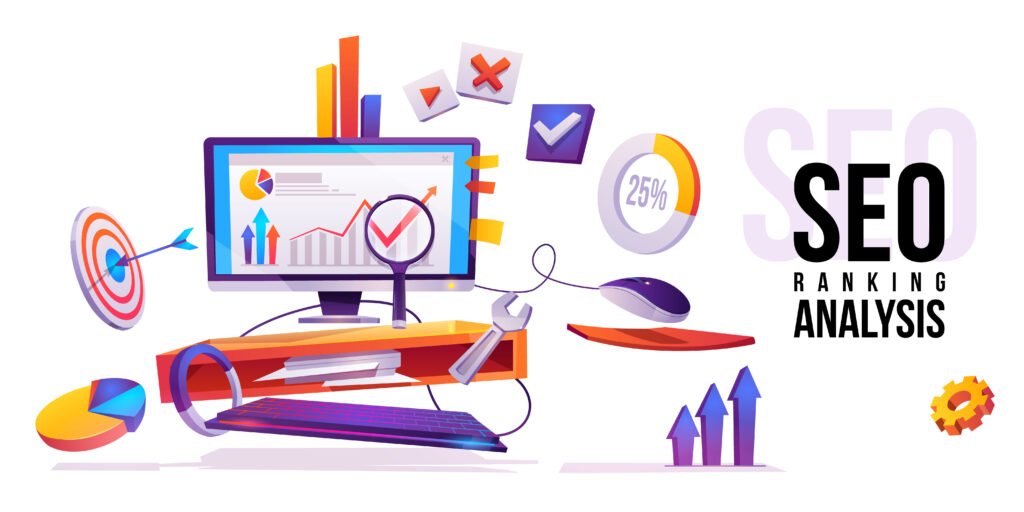- Amelia Sabestine
- 0 Comments
- 1136 Views
In recent times of digitalization, creating a solid online presence is important for businesses and entrepreneurs. All search engines update and enhance their features and algorithms; therefore, a deep understanding of SEO is important to stand out from the competition. Within SEO, “on-page SEO” holds immense significance in evaluating a website’s prominence and position in search outcomes, along with other crucial SEO aspects. But what is on-page SEO exactly?
With the help of this all-inclusive guide, we will explore the fundamental concepts of on-page SEO and the critical strategies that can significantly impact your website’s performance. Whether you are a seasoned digital marketer or a website owner aiming to enhance your online presence, let’s collaborate to unravel the secrets of on-page SEO and discover how it can make a substantial difference to your website’s success.
What Is On-Page SEO In Digital Marketing?
Search engine optimization on-page involves optimizing a website for search engine results (SERPs) when relevant keywords are searched for. In addition to a few visible optimizations, others are hidden. You can increase your SEO capabilities by optimizing more pages on your website, which naturally increases targeted traffic to that page.
Elements Of On-Page SEO
“On-page SEO” is a way of improving the user experience on a perticular web page and the links it receives in search engine results. Here are some essential on-page SEO strategies:
Keyword Optimization
This entails thoughtfully including relevant keywords in your text, Meta tags, headings, and URLs. Search engines can better grasp the context and relevancy of your content if you utilize focused keywords that align with people’s search queries.
Content Quality And Relevance
Producing excellent, educational, and valuable content is crucial for on page SEO. Search engine rankings often favor content that addresses consumers’ needs, offers insights, and answers their queries.
Title Tags
Search engines and users better understand each page’s theme and purpose when the title tags are catchy and keyword-rich. It’s important to keep title tags brief and pertinent, often between 50 and 60 characters.
Meta Descriptions
Well-written Meta descriptions can increase click-through rates (CTR), even if they are not a direct ranking factor. They deliver a summary of the material on the page and push users to click on the link you provide in search results.
Heading Tags (H1, H2, H3, etc.)
To make your content easy to read for readers, it’s important to use appropriate headings. It also helps the search engines comprehend your content’s structure and order/hierarchy.
URL Structure
The user experience can be improved, and crawling and indexing by search engines can be made easier by creating clear, descriptive URLs that contain pertinent keywords.
Internal Linking
Linking to relevant web pages on your website makes it easier for users to navigate and search engines to find and index content.
Image Optimization
It is possible to improve accessibility and make it simpler for search engines to comprehend the overall meaning of the images by giving photos accurate file names and insightful alt text.
Mobile-Friendliness
Mobile-friendly is essential for user experience and search engine rankings, as most internet users browse the web through mobile devices.
Page Speed
User experience and SEO are heavily impacted by how quickly your web pages load. Pages that load more quickly often appear higher in search results.
Why Is On Page SEO Optimization Important?
In addition to its direct impact on visibility, organic traffic, and overall online success, on-page SEO is essential for many reasons. There are several reasons why on page optimization in SEO is important:
Search Engine Visibility
Search engines can better grasp the relevance and substance of your web pages because of on-page SEO techniques. If your websites are optimized with suitable keywords, Meta tags, and properly structured content, search engines will index and rank them more effectively. This enhances the likelihood that users searching for relevant terms will find your website in search engine results.
Organic Traffic
Increased organic (non-paid) traffic to your site results from higher search engine rankings. You draw users actively seeking your information or services by optimizing your sites for particular keywords and user intent. This focused traffic has a higher likelihood of becoming clients or subscribers.
User Experience
The primary objective of on-page SEO is to enhance both search engine optimization and user experience. By developing valuable, well-structured, and user-friendly content, you increase the likelihood of user engagement and encourage them to explore your website further. Positive user experiences lead to higher satisfaction, repeated visits, and overall website performance improvement.
Credibility And Trust
Users usually view websites that appear high in search results as being more reliable and credible. When users often find your website on the first page of search results for searches they make, they develop trust in the usefulness and dependability of your information.
Competitive Advantage
SEO On page can be a crucial differentiator in markets with high levels of competition. By optimizing your pages more effectively, you may outrank the competition in search results, increase visibility, and draw in a bigger portion of the target audience.
Better Conversion Rates
Higher conversion rates might result from material that is relevant to users’ search intent and offers helpful information. With the help of on-page SEO, you can ensure that your content is well-optimized to achieve your aims, whether to sell things, generate leads, or drive sign-ups.
Adaptation To Algorithm Changes
Search engine algorithms are often modified to improve user experiences and prevent spamming techniques. By adhering to on-page SEO best practices, you develop a long-term optimization strategy, making it simpler to adjust to algorithm changes and keep your search rankings.
Mobile-Friendly Experience
Given the growth in popularity of mobile devices, it is crucial to have a mobile-friendly website. Among on-page SEO techniques is optimizing for mobile devices, ensuring your web pages load fast and look good on different screen sizes.
Off-Page Vs. On-Page SEO
It is vital to review the SEO principles to understand the comparisons between SEO onpage and off-page SEO. Three fundamental categories of SEO exist:
· On-page SEO: This refers to actions taken specifically to the page you’re attempting to optimize, including changing its content or introducing keywords.
· Off-page SEO: This refers to activities such as social media promotion, backlinking, listings, PR, guest posting, and more that are done to assist your page rank on other pages of your website or with other websites.
· Technical SEO: This term describes actions taken about the site’s source code, sitemap, speed, security, structured data, and other words, not starting with S.
Although it looks great, the circles overlap since these initiatives are all linked together. For instance, poor page content (on-page) prevents you from obtaining backlinks (off-page) and compressing photos (on-page) improves page speed (technical).
How To Create SEO Content?
For those unfamiliar with the concept, crafting SEO content might appear daunting. However, once you grasp the fundamentals, it becomes a natural process. To create content that captivates search engines, adhere to the following three guidelines:
1. Carry Out Keyword Research
Producing SEO content must start with figuring out the search terms that your target audience make use of. That is the main goal and importance of keyword research.
Using SEO tools, Local SEO keyword research entails learning which phrases and terms your target audience uses to search, how many people use these keywords each month, and what other businesses have published on the subject.
To conduct keyword research, use tools like Ahrefs Keyword Explorer, Uber Suggest, Semrush, Moz Keyword Explorer, and Keyword Surfer. You can uncover appropriate keywords to target in your sector using keyword tools. They are also useful to research already-planned keywords. Using the data from keyword research, you may decide which keywords are profitable for you to target and what you’ll need to offer to fully cover them.
2. Match Search Intent
Even with a thorough understanding of relevant keywords, writers can make the error of writing exclusively for search engines considering their audience. The first step in creating helpful content is matching search intent. To match search intent, you must respond to readers’ inquiries (ideally at the article’s outset).
When you optimize your content for search engines and match search intent, you’ll get information that ranks higher and is also beneficial to readers. When visitors spend a greater amount of time on your website pages and share them with others on social media or with friends, search engines can infer that your material is of a high caliber. Higher ranks follow from this.
3. Site Structure And Post Structure
Subheadings serve more than just aesthetic purposes. They inform search engines about the extent of your post and, if done rightly, can boost your ranks. The groups of content on your website and the way pages and articles are arranged follow the same rules.
Use the proper header hierarchy as well. Experts agree that H1s should only be used for post titles. After that, H2, H3, and so forth can be utilized as header tags. While this doesn’t directly assist SEO, it does make your material simpler to read and crawl, increasing the likelihood that it will rank on search engines—assuming you’ve already generated excellent content.
Some Common On-Page SEO FAQs
1. What are LSI keywords, and how do they impact on-page SEO?
Latent Semantic Indexing (LSI) keywords are terms associated with the primary keyword and give search engines context regarding the topic of the material. Search engines may comprehend the subject more thoroughly and increase the likelihood that your content will rank for a wider range of pertinent search queries using LSI keywords.
2. Does user engagement influence on-page SEO rankings?
User engagement measures like click-through rate (CTR), bounce rate, and time on the page indirectly impact on-page SEO results. Users who find your material important and entertaining are likelier to share it, stick to your page for longer, and visit multiple pages on your website. These encouraging user interaction cues let search engines know your material is valuable and relevant, which could help your results.
3. What role does structured data (Schema Markup) play in on-page SEO?
A defined format called structured data, commonly called schema markup, gives search engines more knowledge about your material. Rich snippets can be added to search engine results using Schema Markup, increasing visibility, click-through rates, and user experience.
4. Is HTTPS important for on-page SEO?
Yes, HTTPS is essential for secure websites and on-page SEO. In addition to providing a secure connection between your website and users, HTTPS encryption gives websites a tiny ranking boost and helps establish confidence. Furthermore, many browsers label non-HTTPS sites as “not secure,” which may discourage visitors from interacting with your content.
5. What is the role of content freshness in on-page SEO?
The freshness of the content can affect search results, particularly for subjects that call for current knowledge. Your website’s likelihood of appearing higher in search results increases when you regularly update and renew your material, which tells search engines that your website offers pertinent and up-to-date information.
Wrapping Up!
Being an expert in on-page SEO is no longer simply a nice ability; it is now necessary for effective online marketing and website optimization. The search visibility and user engagement of your website can be dramatically impacted by understanding the significance of on-page features. You may improve your website’s trustworthiness, draw in relevant organic visitors, and eventually improve search ranks by applying good on-page SEO practices or hiring expert local SEO services.
As search engine algorithms continue to develop, keeping up with the most recent and efficient strategies and incorporating them into your content development process makes sure that your website remains competitive in the always-shifting digital landscape. Whether you’re a seasoned digital marketer or a company owner looking to improve your online presence, devoting time and effort to learning on-page SEO will surely pay off in the long run by enabling your website to operate at its best.




